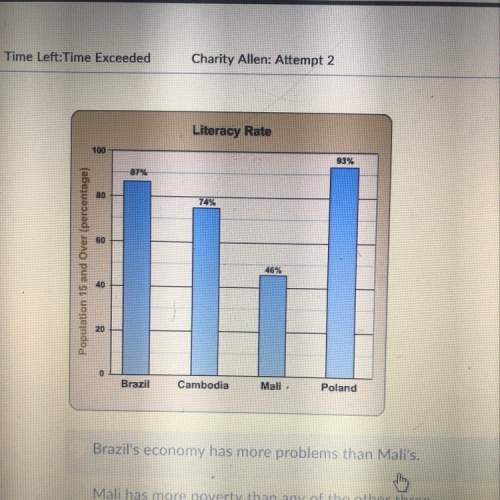Some history questions pls helps ASP!
What factors at the end of World War I ultimately contri...

History, 06.05.2020 01:28 anthonygarib24
Some history questions pls helps ASP!
What factors at the end of World War I ultimately contributed to the global depression?
1. Anger stemming from the brutal war made it difficult for countries to effectively trade and cooperate
2. The US demanded recover European countries repay their war loans, created extreme economic instability, and insecurity
3. Huge and important economies were deeply impacted by years of warfare, leaving the rest of the global economy unstable
(A) Just 1
(B) 1 and 2
(C) 1 and 3
(D) 1, 2, and 3
2 Read the selection from the article.
However, before World War II came along and revolutionized all political and economic formulas, none of FDR’s exertions managed to drop the unemployment rate below 14 percent.
Which of the following can be inferred from the selection above?
(A) FDR's attempts to end the Great Depression were a complete failure.
(B) Despite the changes FDR made, he could not totally end the Great Depression.
(C) FDR made key mistakes in his attempt to dramatically change the government.
(D) FDR did not make a strong enough effort to end the Great Depression.
3 Based on this article, which statement best represents the economic environment at the end of World War I?
(A) The world had entered into a global economy, wherein national economies were interconnected.
(B) Industrialization and modernization helped boost the US economy. (C) Individual countries had their own isolated economic systems, some of which remained fine.
(D) Environmental disasters around the world resulted in a widespread economic downturn.
4 Read the following statement.
The U. S. government was unprepared to deal with economic problems.
Which sentence from the article BEST supports the statement above? (A) The United States' actions in World War I were minor and occurred only toward the end of the conflict that lasted from July 28, 1914, to November 11, 1918.
(B) Even the country's minimal role went against its tradition of not involving itself in Europe's affairs, which resulted in Americans turning themselves and their country even more inward during the 1920s.
(C) Meanwhile, the government's public spending was low and the federal government was in a weak state to fight the looming depression.
(D) Known as the Great Crash, stock prices plunged, causing thousands of banks to fail, tens of thousands of businesses to collapse, and millions of people to become unemployed.
5 How did domestic US policy hurt the economies of other countries?
(A) The US refused immigrants entry which meant that more impoverished people remained in their home countries. (B) When they refused to join the League of Nations, the US hurt other economies by cutting the amount of money the league would have.
(C) The US Government took all their money out of other countries' banks when World War I began.
(D) High taxes on goods from foreign countries made international trading harder.
6 Read the sentence from the section "Stocks crash, millions out of work."
In October of 1929, the bubble burst.
Based on the article, the word "bubble" refers to all of the following EXCEPT:
(A) increasing stock prices
(B) feelings of optimism
(C) limits on immigration
(D) the private banking system
7 Which of these is something the author of the article states happened as a result of the Great Depression?
(A) the start of World War II
(B) the election of Herbert Hoover
(C) the formation of the United Nations
(D) the passing of the 22nd Amendment

Answers: 2


Other questions on the subject: History

History, 22.06.2019 04:40, flowergirly34
Select all the correct answers. what were two effects of the french revolution in france?
Answers: 3

History, 22.06.2019 10:30, MathChic68
Which event is considered to be start of the "hellenistic era"? a) the founding of the roman empire b) the death of alexander the great c) the end of the peloponnesian wars d) the founding of the roman republic
Answers: 1

History, 22.06.2019 11:00, youngaidan21
What is the matter with minds of society these days ?
Answers: 2

History, 22.06.2019 11:00, AlimBas8
Which best describes why web dubois and booker t. washington's approaches to and strategies towards civil rights were so different? a. washington faced minimal and mild discrimination as he was raised in a prominent family in the north. dubois faced harsh discrimination, restrictions from jim crow laws, while growing up in the post-reconstructed south. b. dubois was fortunate enough to have parents who were well involved in politics, rising from smaller government positions to higher federal positions, while washington was raised by uneducated and politically excluded slave parents. c. washington was unwilling to speak out publicly, which restricted the audience he reached, thus the support he gained, while dubois spoke eloquently to small and large audiences, thus able to gain more personal and monetary support. d. dubois was born in the north, earned his doctorate from harvard, after having scholarships from other prestigious institutions, while washington was born a southern slave, and his determination allowed him to gain education and respect as a leader.
Answers: 1
You know the right answer?
Questions in other subjects:








Mathematics, 22.06.2021 19:30






